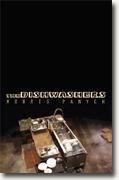The Dishwashers: A Play
Morris Panych
book reviews:
· general fiction
· chick lit/romance
· sci-fi/fantasy
· graphic novels
· nonfiction
· audio books
· author interviews
· children's books @
curledupkids.com
· DVD reviews @
curledupdvd.com
newsletter
win books
buy online
links
home
for authors
& publishers
for reviewers

 |
The Dishwashers: A Play Morris Panych Talonbooks Paperback 128 pages September 2005 |
|
Far below the hustle and bustle of a successful society restaurant, the dishwashers toil in a windowless basement, engaging in an intense, sardonic battle of wits from the moment the new employee, Emmett, steps into Act One. Dressler is the overseer of this dark kingdom, king-of-the-hill, albeit one made of dirty dishes.
Ranging from the philosophical to the absurd, their discussions are the essence and bane of each day, the push and pull mirroring society at large. Spewing his part-Marxist, part-socialist, but always self-serving ideology, Dressler proves himself a petty demagogue, powerless to control Emmett’s eventual escape: “This isn’t a choice, it’s a hole we fill in.” Dressler possesses the language of the political poseur - “supposition of accountability,” “anticipatory spoilage,” “unseen reliability” - maintaining his position through expedience, skimming a small profit where it won’t be noticed by management. Precariously perched on top of the lowest heap in the restaurant food chain, Dressler pontificates endlessly to his captive audience of two. Dressler reigns in this private lair, as they work doggedly through uneventful days. Emmett at first resists, then accepts his fall from previous customer to the lowliest worker, dreaming of his former wealth. Finally, mirroring Dressler’s pragmatism, Emmett seizes opportunity, boosting himself back into the social strata to which he relentlessly aspires. Emmett rails against the system and Moss eventually gets his pink slip (although he doesn’t leave), while Dressler resists change at every turn, relishing his role as de facto leader, nagging the recalcitrant Emmett to tailor his aspirations to the confines of his employment: “My hatred has become my discipline and my discipline my love.” This microcosm of society at large is a brilliant and fascinating portrait of class as it exists at every level, even the relatively invisible. Originally published on Curled Up With A Good Book at www.curledup.com. © Luan Gaines, 2006 |
|
|
|
 Click here to learn more about this month's sponsor! |
|
| fiction · sf/f · comic books · nonfiction · audio newsletter · free book contest · buy books online review index · links · · authors & publishers reviewers |
|
| site by ELBO Computing Resources, Inc. | |
 Even this so-called classless society is riddled with the rituals of dominance, a pre-ordained pecking order where Emmett is the lowest common denominator. Replacing Moss, an old and ailing long-term employee, Emmett questions his place in this netherworld, recent financial disaster forcing him into this repetitious nightmare. Emmett bemoans his lowered status, formerly one of the upstairs customers, only to be bombarded by the trivia of Dressler’s pretensions.
Even this so-called classless society is riddled with the rituals of dominance, a pre-ordained pecking order where Emmett is the lowest common denominator. Replacing Moss, an old and ailing long-term employee, Emmett questions his place in this netherworld, recent financial disaster forcing him into this repetitious nightmare. Emmett bemoans his lowered status, formerly one of the upstairs customers, only to be bombarded by the trivia of Dressler’s pretensions.